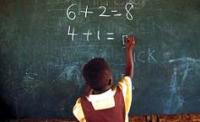







|
News and Information
PanAfrica: Britain Pledges 15 Billion Dollars to Education
| April 12, 2006 |

Agencia de Informacao de Mocambique (Maputo)
April 10, 2006
Posted to the web April 10, 2006
Maputo
The British Chancellor of the Exchequer (Finance Minister), Gordon Brown, on Monday pledged 15 billion dollars of British aid to education in developing countries over the next ten years.
He was speaking in Maputo, alongside Mozambican President Armando Guebuza, launching an initiative to ensure that the goal of universal primary education across the globe is met by the year 2015.
The importance of this initiative could be gauged from the other guests present - who included the two most powerful finance ministers in Africa, Trevor Manuel of South Africa, and Ngozi Okonjo Iweala of Nigeria, and the icon of African liberation struggles, former South African President Nelson Mandela.
Brown said the British initiative was a follow-up to the "Make Poverty History" campaign of last year, and the summit of G8 group of most industrialised countries held in Scotland in July 2005.
"Make Poverty History forced governments to deliver promises of aid, and we must keep those promises", he declared.
It was scandalous, Brown added, that every day there are 100 million children "who don't go to school because there is no school for them to go to".
What was required, he said, was the largest school building programme and the largest teacher training programme the planet had ever seen. On UNESCO estimates, to meet the needs, between 15 and 20 million new teachers must be trained in the next decade.
Britain intended to keep the promises made at the G8 summit, Brown stressed. Hence the unusual move of pledging aid earmarked for a specific purpose over a long period.
If all the other countries of the rich north were to follow the British lead, "then the target will be met", said Brown. For their part, developing countries are expected to produce ten year plans for education, or to make their existing plans more ambitious.
Guebuza sketched the outline of Mozambique's plans, which include reducing the pupil-teacher ratio from the current figure of 74 to one, to 45 to one by 2015. By that time, he said, the system of schools working three shifts should be abolished, and all teachers should have adequate qualifications.
There should be free, quality education for all children for the seven years of primary education, he added, and a massive increase of skills-based technical and professional education, closed linked to the needs of the productive sector of the economy.
Guebuza stressed the importance of the government knowing how much aid from loans or grants will be available and when.
"Funding should be predictable, and made available in good time", he said. "If our partners make the funds available within the appropriate time frame, then we can recruit more teachers and pay them".
Two British schoolchildren, 13 year old Lily King Taylor and 12 year old Jenade Sharma, who have been active in education campaigning in Britain, accompanied Brown, bringing the solidarity of British schools.
In a round table with the ministers and Presidents they, and several Mozambican children asked questions which Brown judged as "more effective than the ones we get in the House of Commons".
Lily asked Mandela if he was really retired. Why had he taken time off from his retirement to attend the launch of this initiative ?
He assured the children that he was indeed retired from public responsibilities, "but I could not refuse to be here.
Winning the rights of all children to go to school is so important that I'm out of retirement for this day".
"Last year we made great advances against poverty", said Mandela. "Now comes the difficult part - keeping those promises.
Promises to children should never be broken, and Gordon Brown is showing that he will stand by his word".
Trevor Manuel stressed "We can change the world by investing in education. We will not allow the rich countries to forget the promises they have made".
Okonjo Iweala said that currently seven million children in Nigeria are not at school. But the government had allotted money from debt relief to deal with this problem, and she expected to halve the number of children outside school within three year, and within six years ensure primary education for all Nigerian children. |
Source: www.allafrica.com |
| http://allafrica.com/stories/200604100642.html |
|
| Support Caprivi Freedom |
Fill out the form below to become a member of this site and receive our regular newsletter.
|

|

